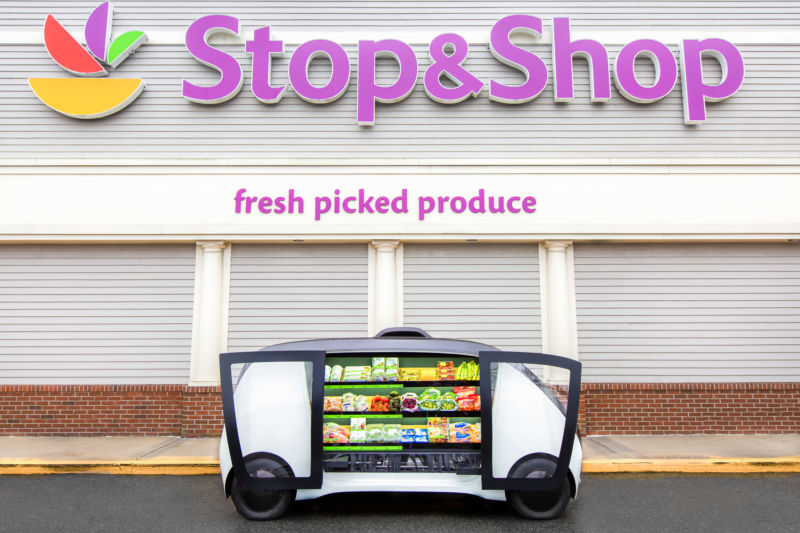
Stop and Shop, a major grocery chain in the Northeast, will begin offering a driverless grocery service in the Boston area, the company announced Wednesday.
Stop and Shop isn’t the first store to make an announcement like this—Kroger and Walmart are both working on driverless grocery services of their own. But those are delivery services. The Stop and Shop service, by contrast, puts an entire miniature grocery store on wheels. It’s a partnership with Robomart, a startup we first covered last June.
Conventional delivery startups like Nuro and Udelv envision a future where the customer chooses a few items of produce and those specific items are sent out in a driverless vehicle. Robomart’s plan, on the other hand, is to send the entire produce aisle to the customer’s driveway. Once it arrives, the customer gets to inspect the merchandise and choose which items to buy. Robomart says it will use a mix of cameras and RFID tags to determine which products a customer took and automatically charge for them.
When stock runs low, the vehicle will drive back to a nearby Stop and Shop for restocking. A vehicle may be able to make several customer stops before it needs to return to the store—potentially making it more efficient than a conventional delivery service. Robomart CEO Ali Ahmed says that the companies haven’t decided the exact launch location within the Boston area yet.
Customers will be able to inspect the merchandise before buying it, making it a particularly appealing model for selling fresh produce. Ahmed also argues that the Robomart model ultimately creates a better customer experience overall, saying that choosing groceries using a mobile app is a more tedious and frustrating process than just taking items off a shelf.
At the same time, there are some serious downsides to this model. A traditional grocery delivery service can offer any item carried by a full-size grocery store. By contrast, Robomart customers will have to choose from a much smaller range of products that can fit on the shelves of a self-driving vehicle. In the long term, a store might offer several different Robomart vehicles—a produce car, a dairy car, a meat car, and so forth—but this could complicate both the logistics of restocking the vehicles and the user interface.
Ahmed says that Robomart’s vehicles have self-driving capabilities but that the vehicles will initially be teleoperated by a remote “driver.” They will initially be limited to a top speed of 25 miles per hour—the same speed limit observed by competitor Nuro.
Ahmed expects the low cost of operating Robomart to enable stores to offer service without a delivery fee—though he said retail partners like Stop and Shop have ultimate authority over pricing, and those details haven’t been worked out yet for the Stop and Shop partnership.
https://arstechnica.com/?p=1442247

